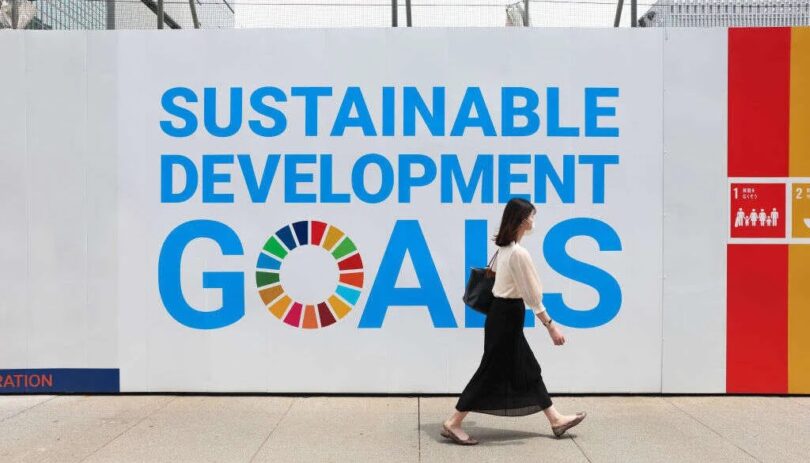Hajra Fawad
While the buzzword “sustainability” hangs heavy in the air, obscuring even the once-urgent whispers of “democracy” and “anti-terrorism,” a fundamental dissonance lurks beneath the hype. Can development, with its hallmarks of industrialization, cheap energy, and sprawling cities, ever truly co-exist with the ideals of environmental stewardship and intergenerational equity enshrined in sustainability?
In developing nations like Pakistan, this dissonance echoes like a haunting melody. The Global North, cloaked in the green mantle of leadership, sets ambitious sustainability goals, their voices ringing hollow against the backdrop of histories steeped in resource plunder and fossil-fueled expansion. Consider the legacy of colonialism.
The Indian subcontinent, once a vibrant tapestry of biodiversity and thriving civilizations, witnessed its riches ruthlessly extracted. Spices, silks, and even precious stones like the Koh-i-Noor, now a crown jewel in Buckingham Palace, became trophies of a rapacious expansion. This is not ancient history; it is a potent reminder of the unequal playing field on which the sustainability game is played.
The Sustainable Development Goals (SDGs), crafted and championed by the developed world, present a seemingly noble roadmap towards a greener future. However, beneath the veneer of inclusivity lurks a subtle inequality. While poorer nations strive towards sustainability within the SDG framework, their development aspirations remain perpetually on hold. It’s a Hobson’s choice: prioritize the environment and remain mired in poverty, or pursue development at the cost of our future.
A glance at Climate Watch data exposes a harsh reality: the United States, Russia, South Korea, and Kuwait hold the dubious distinction of leading per capita CO2 emissions, figures that continue to ascend steadily. Even Finland, with a rise from 1.27t in 2015 to 11.16t in 2020, demonstrates a worrying disregard for the Paris Agreement’s objectives. This trend casts a long shadow over the self-proclaimed environmental leadership of these nations, prompting the question: why the grand pronouncements of global salvation if carbon footprints remain stubbornly high?
The answer, it seems, lies in the intricacies of the Sustainable Development Goals (SDGs) Index. This metric, designed to track progress towards the ambitious SDG targets, has inadvertently elevated rich and developed nations to the status of environmental paragons. It conveniently overlooks the fact that developed nations, despite lagging behind on environmental targets, often rank higher due to their strong performance in developmental indicators. The burden of responsibility, it seems, rests solely on the shoulders of those least equipped to bear it.
The irony is not lost on us. As the consequences of their past excesses – depleted resources, ravaged ecosystems, and rising sea levels – cascade outwards, impacting vulnerable nations like ours the most, we are urged to tread a different path – a path paved with clean energy and restrained consumption, yet devoid of the very tools that propelled the Global North to its current prosperity.
Meanwhile, their own exploitation continues, albeit in a more nuanced form. Gone are the days of overt colonial looting; contemporary plunder now wears the mask of free trade agreements and corporate greed. Kylie cosmetics, exploiting overworked and underpaid Bangladeshi workers to produce luxury goods, is just one example of this insidious neocolonialism. Even the “war on terror” in the Middle East, draped in the language of humanitarian intervention, stands accused of masking a hunger for oil reserves. Iraq was completely destroyed to find some phantom weapons of mass destruction, but the world knows the search was actually for oil, and not peace.
Despite the seemingly overwhelming imbalance, developing nations like Pakistan refuse to be mere victims. Resource-constrained as they may be, they are actively researching and innovating sustainable solutions. This stands in stark contrast to the self-proclaimed environmental leadership of the Global North, whose sprawling carbon footprint and underfunded environmental research paints a different picture. Take Pakistan, for example. Contributing a mere 1% to global emissions, it stands as a poignant testament to this dissonance. Despite its minuscule role in the climate crisis, it ranks as the fifth most vulnerable nation to its consequences.
This incongruity breeds a profound inequity. Pakistan is denied the luxury of gradual, measured progress towards sustainability. The urgency of its predicament demands immediate action, yet its resources are woefully inadequate. Foreign “aid,” a term laced with a bitter irony, barely grazes the surface of the colossal costs it must bear. As the Washington-based Global Financial Integrity and the Norwegian School of Economics reveal, “the flow of money from rich countries to poor countries pales in comparison to the flow that runs in the other direction.”
Herein lies the crux of the matter. The green speeches of the Global North ring empty in the face of this persistent financial hemorrhage. Their “aid,” meager and conditional, offers a mere salve on a gaping wound. The cruel calculus becomes clear: keeping developing nations perpetually on the back foot serves the exploitative interests of the wealthy. Exploitation in its modern garb – masked as resource extraction, trade agreements, and the perpetuation of unequal power dynamics – continues to fuel the very environmental crisis they purport to champion.
The harsh reality is that our efforts, valiant as they may be, pale in comparison to the inaction of the North. Their aid, a mere pittance against the ecological debt they owe, hardly compensates for the devastation they have caused. The “international rules” they seek to impose are empty words in the face of their own historical transgressions.
Therefore, a bold re-evaluation is in order. Pakistan, and other developing nations similarly situated, cannot afford to remain caught in the sustainability trap. We must acknowledge that genuine progress lies not in chasing an elusive ideal, but in prioritizing our own development. This is not an escape from the green agenda, but its essential prerequisite.
By tapping into our natural resources, like the vast Tharparker coal reserves, we can fuel our economic engine. This, in turn, will empower us to tackle climate change more effectively, not through forced abstinence, but through technological innovation and resource independence. We can learn from the mistakes of the past and invest in clean coal technologies, carbon capture and storage, and renewable energy development. This is not to endorse unbridled exploitation, but to recognize that true progress lies in responsible resource management and technological advancement.
Developed nations may lecture us on sustainability, but their hypocrisy is evident in every environmental report. They cannot preach abstinence while gorging themselves on fossil fuels and outsourcing their pollution to the developing world. It is time we carve our own path, one that prioritizes the well-being of our people and recognizes the limitations imposed by a past not of our making. We cannot afford to be foot soldiers in their green crusade while they continue to pollute with impunity.
This is not a rejection of sustainability, but rather a demand for equity and shared responsibility. The developed world must acknowledge their historical transgressions and contribute their fair share to cleaning up the mess they have created. Technology transfer, not intellectual property walls, must be the foundation of our collective green future. Developed nations must provide genuine financial support, not strings-attached aid packages, to empower developing nations in their pursuit of sustainable development and compensate for the damages they have caused to the world.
This is the Pakistani perspective on sustainability: a pragmatic call for self-reliance and development, not as an alternative to a green future, but as its essential prerequisite.







